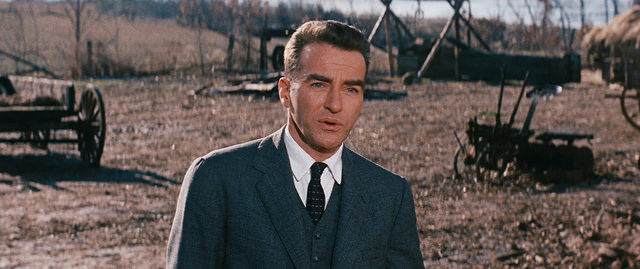
Dir: Elia Kazan | Writer: Paul Osborn | Cast: Montgomery Clift, Lee Remick, Jo Van Fleet, Albert Salmi, J C Flippen | 110min | Drama | US
The prologue to Elia Kazan’s Wild River, set in 1931, is black and white documentary footage depicting the Tennessee river flooding the county. A voiceover explains that The Tennessee Valley Authority wanted to dam the river but some residents living in homes on the banks and islands refused to move. From this touching if auspiciously New Deal propaganda opening WILD RIVER unfolds onto the screen in cinemascope and colour, giving us a melancholic story of change: the obdurate old against the rapid new, the individual versus the community, all entangled with questions about tradition and the positive side of progress.
TVA agent Chuck Glover (Montgomery Cliff) arrives from Washington to try and persuade Ella Garth (Jo Van Fleet) to move from Garth Island. It will soon be flooded but she refuses to leave. Glover meets Carol Garth (Lee Remick) and asks for her help to persuade the old woman to leave. She is a widow and single mother of two. Carol and Chuck fall in love. Chuck also develops a love and understanding of Ella and her connectedness to the land.
WILD RIVER has a classic simplicity. Kazan’s marvellously quietist direction digs deep into the complexities of this very American tale of ‘rugged individualism’ The early sequence of the Garth’s’ first meeting with Glover illustrates Kazan’s mastery at establishing his characters’ hopes and fears. Glover arrives at the farm and says he would like to talk to Ella. She says nothing, gets up from her rocking chair and goes indoors. Chuck then addresses Carol. She looks at him, revealing a slight hint that the stranger has awakened something inside her. Then she too remains silent and moves away. Chuck sees her six year old daughter sitting on the porch. Yet before he can befriend her she’s called in by her mother.
Glover threatens to uproot the Garths but they are staying put. We are made to feel the opposition of sense versus sensibility as Kazan draws out both the tenderness and danger of the encounter. It is a most basic confrontation, comprised of subtle glances and body language, yet so carefully and judiciously edited, introducing conflicts and hopes that the film will later develop (Note the exquisite framing and the moment when the front door is closed on Garth to evoke Ford’s The Searchers.)
WILD RIVER’s atmosphere is enhanced by Elsworth Fredericks’s photography. He and Kazan create lyrical compositions that are thoughtful and reflective even in the film’s moments of violence. Whilst Kazan’s direction of the romance between Montgomery Cliff and Lee Remick manages to achieve a screen chemistry up there with Marlon Brando and Eva Maria Saint in On the Waterfront. Such great acting, along with Jo Van Fleet’s superb performance (Remarkable for the fact that she was then aged forty five and made up to play a stubborn eighty year old woman of great dignity.)
“The most dangerous erosion is not to the land – it’s when your capacity for living gets eroded.”
Chuck refers here not only to the threat of social change, but ironically also his own inability to bond with Carol, who deeply loves him. For Wild River is a meditative film about the ambivalence of change and progress; with emotional loss being more intense than any material gain. Along with On the Waterfront, America, America and East of Eden Kazan is here at the height of his powers. ALAN PRICE
ON DUAL FORMAT BLURAY COURTESY OF EUREKA MASTER’S OF CINEMA